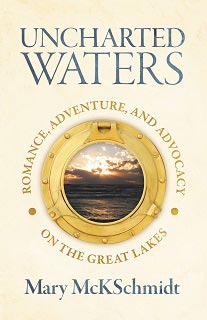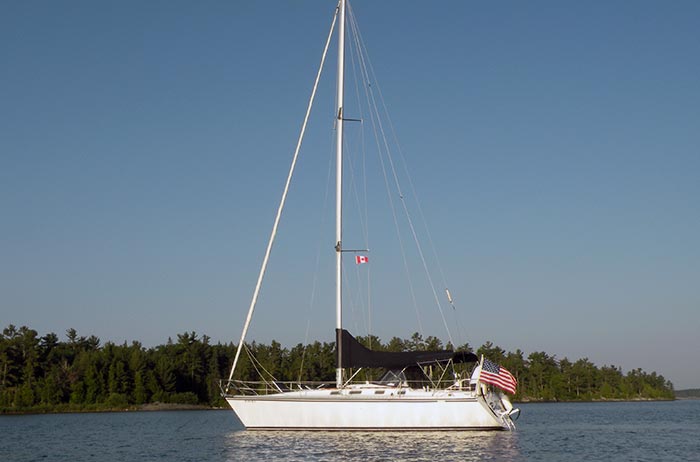Advertisement
Excerpt from "Uncharted Waters: Romance, Adventure, and Advocacy on the Great Lakes" by Mary McKSchmidt.
In this chapter, The Stern Head, the author agonizes over how to respond when a guest asks permission to empty his bladder.

"Is it okay if I use the stern head?" a friend asks. His face is serious, but is he?
I glance over at Rubin. Everyone who knows me has heard my spiel at least once, most likely several times. I am passionate about updating the antiquated sewage systems dumping millions of gallons of raw sewage into the Great Lakes during heavy rains. I advocate publicly for the prioritization of local, state, and federal dollars to finance new facilities, which would separate sewage systems from storm runoff to minimize the spills.
"We can live without a lot of things; clean, fresh water is not one of them," I say to anyone and everyone willing to listen. My enthusiasm makes me an easy target to tease, so I don't know. Is he serious? Is he really asking if it's okay to pee off the back of our boat?
The weight of responsibility for cleaning up Lake Michigan sits heavily on my shoulders. I know it is not coincidence that the universe has steered me north to a home near this lake. And yet, I am discouraged. I have poured my energies into writing columns and giving presentations on the need to restore and protect the Great Lakes. I've watched former Steelcase CEO, Peter Wege, and the Wege Foundation pull together leaders of zoos, aquariums, environmental, conservation, fishing, and hunting organizations to create the Healing Our Waters Great Lakes Coalition. Rather than taking a splintered approach to obtaining necessary legislation and funding for the initiatives outlined in the 2005 Great Lakes Regional Collaboration report, the coalition has created one massive, powerful lobbying voice. It should be a voice difficult to ignore.

And yet, it seems so little happens. From afar, the lakes look clear and pristine. People do not see their restoration as a pressing issue. As a country, we tend to wait until things become a crisis before we act. Like Hurricane Katrina. In 2005, Katrina ripped through New Orleans, eventually costing taxpayers more than $122 billion in repairs. The cost to human lives is incalculable. And yet, much of the damage could have been avoided if Congress had ratified and funded the 1998 plan to redesign the levees. The plan was shelved because of its $14 billion price tag. I fear our Congressional leaders will ignore the Great Lakes, just as they ignored the levees. And with each passing year, the $20 billion cost of restoration increases as preventative measures are ignored and damaging pollutants mushroom in scope and severity. At some point, the damage will be irreparable.
If our friend is serious, I don't know what to say. Admittedly, I, too, have peed and puked in these waters. But that's before I knew better, before I understood the fragility of the lake's ecosystem. He and I both know we do not share the same values regarding the environment. The intellectual side of me says no one on our boat is ever going to pour human waste directly into this lake. The emotional, anything-for-a-friend side says maybe it's okay this one time. Surely, he is just giving me a hard time.
"You know," our friend continues, "my using the stern head is nothing, compared to all the sewage dumped by the big cities into this lake."
He is serious.
I want to say everyone can help; everyone can do little things to make a difference. And if we start with even the smallest of steps, the distance grows shorter and the bigger steps easier. But I realize others do not share my beliefs or sense of urgency, certainly not our friend. I fear too much passion spoken too frequently dulls the message, or worse, drives a wedge between the very people who must find ways to live alongside each other respectfully and peacefully, while sharing limited resources. I am working hard on smoothing the intensity of my message, on listening more carefully to the views of others. But the little voice inside me weeps at the thought of allowing someone to pee from the very boat that has reconnected me to this lake.
The swirling dilemma chews up at most twenty seconds. Rubin turns to look at me, and I detect an inkling of a smile.
"Did you know most people found drowned in Lake Michigan had their flies open?" he says.
We all laugh, and our friend climbs down the companionway to the head, tucked just off the main cabin, to relieve his bladder.
